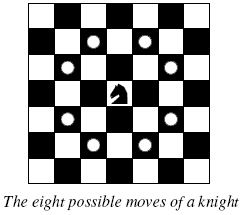A Knight's Journey
| Time Limit: 1000MS | Memory Limit: 65536K | |
| Total Submissions: 49200 | Accepted: 16690 |
Description
 Background
Background
The knight is getting bored of seeing the same black and white squares again and again and has decided to make a journey
around the world. Whenever a knight moves, it is two squares in one direction and one square perpendicular to this. The world of a knight is the chessboard he is living on. Our knight lives on a chessboard that has a smaller area than a regular 8 * 8 board, but it is still rectangular. Can you help this adventurous knight to make travel plans?
Problem
Find a path such that the knight visits every square once. The knight can start and end on any square of the board.
Input
The input begins with a positive integer n in the first line. The following lines contain n test cases. Each test case consists of a single line with two positive integers p and q, such that 1 <= p * q <= 26. This represents a p * q chessboard, where p describes how many different square numbers 1, . . . , p exist, q describes how many different square letters exist. These are the first q letters of the Latin alphabet: A, . . .
Output
The output for every scenario begins with a line containing "Scenario #i:", where i is the number of the scenario starting at 1. Then print a single line containing the lexicographically first path that visits all squares of the chessboard with knight moves followed by an empty line. The path should be given on a single line by concatenating the names of the visited squares. Each square name consists of a capital letter followed by a number.
If no such path exist, you should output impossible on a single line.
If no such path exist, you should output impossible on a single line.
Sample Input
3 1 1 2 3 4 3
Sample Output
Scenario #1: A1 Scenario #2: impossible Scenario #3: A1B3C1A2B4C2A3B1C3A4B2C4
思路:一道简单的dfs题,只要遍历完整个棋盘就ok,注意字典序,记得回溯(第一遍忘回溯了WA一发)
上代码:
#include<cstdio>
#include<cstring>
using namespace std;
typedef struct
{
int px;
char py;
} P;
P p[15000];
int chess[35][35];
char tran[]="#ABCDEFGHIJKLMNOPQRSTUVWXYZ";
int n,m;
int flag;
int cnt;
int u;
void dfs(int x,int y)
{
cnt--;
chess[x][y]=1;
p[u].px=x;
p[u].py=tran[y];
u++;
if(cnt==0)
{
flag=1;
return ;
}
int dx[8]={-1,1,-2,2,-2,2,-1,1};
int dy[8]={-2,-2,-1,-1,1,1,2,2};
for(int i=0;i<8;i++)
{
int tx=x+dx[i];
int ty=y+dy[i];
if(tx>=1&&tx<=n&&ty>=1&&ty<=m&&chess[tx][ty]==0)
{
dfs(tx,ty);
if(flag==1)
break;
chess[tx][ty]=0;
u--;
cnt++;
}
}
return ;
}
int main()
{
int t;
scanf("%d",&t);
for(int l=1;l<=t;l++)
{
scanf("%d%d",&n,&m);
flag=0;
for(int i=0;i<34;i++)
{
for(int j=0;j<34;j++)
chess[i][j]=1;
}
for(int i=1;i<=n;i++)
{
for(int j=1;j<=m;j++)
chess[i][j]=0;
}
cnt=n*m;
u=0;
dfs(1,1);
if(flag==0)
printf("Scenario #%d:\nimpossible\n",l);
else
{
printf("Scenario #%d:\n",l);
for(int i=0;i<u;i++)
printf("%c%d",p[i].py,p[i].px);
printf("\n");
}
if(l!=t)
printf("\n");
}
return 0;
}